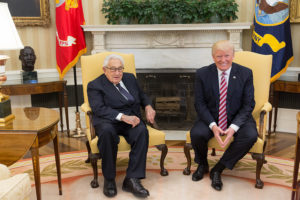
President Donald Trump meets with former National Security Advisor and Secretary of State Henry Kissinger, Wednesday, May 10, 2017, in the Oval Office of the White House in Washington, D.C. (Official White House Photo by Shealah Craighead)
William Smith, writing at The American Conservative, explains to readers Henry Kissinger’s view of what is necessary for a balanced world; enlightened statesmen and restraint. Smith writes (abridged):
Ironically, it may be the work of Henry Kissinger that can show realists an intellectual path toward restoring a sense of morality in foreign policy.
For Kissinger, peace depends upon “a system of independent states refraining from interference in each other’s domestic affairs and checking each other’s ambitions through a general equilibrium of power.” The Peace of Westphalia and, to some degree, the Congress of Vienna embodied such an arrangement, offering the lesson that balance-of-power theory is indispensable in analyzing world events.
However, Kissinger was intellectually astute enough to recognize that, in order to create and maintain this equilibrium of power, something more than a mechanical balance is required: enlightened statesmen. Kissinger states explicitly that balance-of-power “does not in itself secure peace.” If world leaders refuse to play by Westphalian rules, the system will break down. He warns of the rise of radical Islamists, for example, who refuse to think in Westphalian terms.
Kissinger also says that enlightened leaders must not only recognize the realities of power politics and the hard Machiavellian truths of international competition, but possess a certain moral quality that he calls “restraint.
Read more here.
If you’re willing to fight for Main Street America, click here to sign up for my free weekly email.





